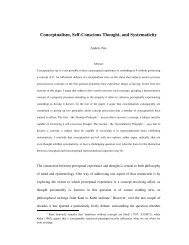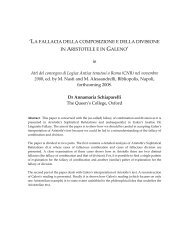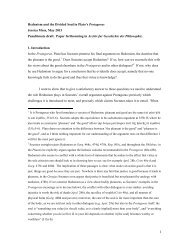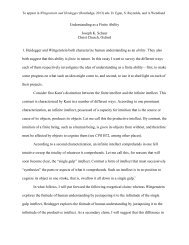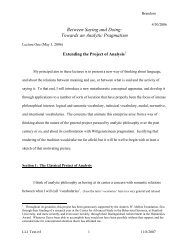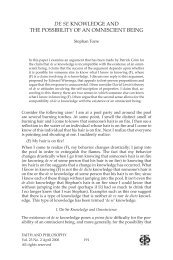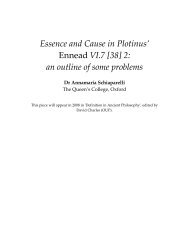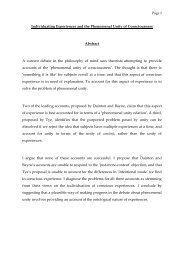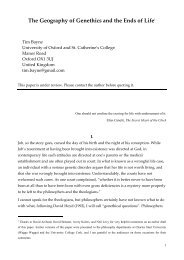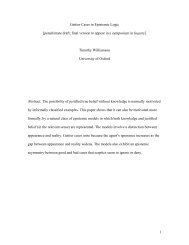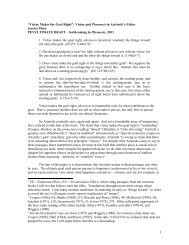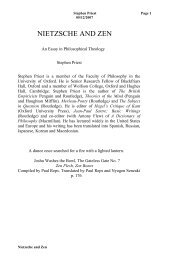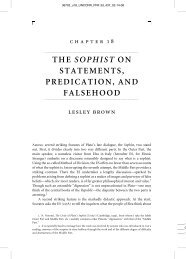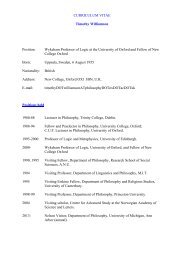What Aristotle can teach us about personality disorder - University of ...
What Aristotle can teach us about personality disorder - University of ...
What Aristotle can teach us about personality disorder - University of ...
Create successful ePaper yourself
Turn your PDF publications into a flip-book with our unique Google optimized e-Paper software.
their central role in the good life quite generally. In some sense, these traits constitute the basic<br />
capacity to find a way to balance between extremes, and do what the situation requires despite<br />
pressures, from within or from the world, to behave in ways that are not for the best. Impulsivity – a<br />
tendency to act without thinking, out <strong>of</strong> whatever desire or emotion grips you in the moment –<br />
stands in the way <strong>of</strong> moderation and temperance. Traits that lie at the other extreme from<br />
impulsivity perhaps include an excess <strong>of</strong> duty, a lack <strong>of</strong> spontaneity, a kind <strong>of</strong> perfectionism. These<br />
too express, if not a lack <strong>of</strong> moderation or temperance, then too much <strong>of</strong> it.<br />
Why is impulsivity detrimental to wellbeing? Most obvio<strong>us</strong>ly, if you act without thinking, on the spur<br />
<strong>of</strong> the moment, you may act out <strong>of</strong> anger, or fear, or shame, and so may behave in ways that you<br />
later regret. Such emotions do not typically lead to actions in your own or others’ best interests. But<br />
impulsivity does not j<strong>us</strong>t lead to regret. It also compromises the possibility <strong>of</strong> strong and stable<br />
relationships – with others, but also, I suggest, with your future self.<br />
<strong>Aristotle</strong> would recognize the adverse effect that impulsivity <strong>can</strong> have on interpersonal relationships.<br />
If you are impulsive, then others <strong>can</strong>not rely on you to keep promises and see through<br />
commitments, or to look out for their best interests when in the grip <strong>of</strong> strong desires and emotions.<br />
An impulsive person is unpredictable and volatile, rather than reliable and measured, and this<br />
naturally compromises their relationship with others. But impulsivity also has an adverse effect on a<br />
person’s capacity for self-autonomy and self-creation. These are central post-Enlightenment values,<br />
much more important to <strong>us</strong> in modern society than they were in ancient Greece.<br />
If you are impulsive, it is not simply that others <strong>can</strong>not rely on you. You <strong>can</strong>not rely on yourself to<br />
keep your promises and commitments and look out for yourself either – to maintain a reliable,<br />
measured way <strong>of</strong> being over time. For this reason, impulsivity is equally bad for your relationship<br />
with yourself. Your present self <strong>can</strong>not be tr<strong>us</strong>ted to act in your future self’s best interests. And even<br />
more, your present self <strong>can</strong>not tr<strong>us</strong>t your future self to act in its own then best interests. This may<br />
be part <strong>of</strong> what makes changing entrenched patterns so hard for those who are impulsive. Why<br />
should you make the effort to change entrenched patterns today – an effort which will demand<br />
great willpower, if you are impulsive – if you <strong>can</strong>not tr<strong>us</strong>t yourself to do the same tomorrow?<br />
Consider, for example, an addict struggling to abstain from their drug <strong>of</strong> choice. Forgoing the drug is<br />
hard. Perhaps it is their habitual way <strong>of</strong> coping with intense psychological distress. There is little<br />
reason to break the cycle <strong>of</strong> <strong>us</strong>e and make the effort to abstain today, and bear that distress, if they<br />
<strong>can</strong>not tr<strong>us</strong>t themselves not to relapse tomorrow. Why bother?<br />
This is why impulsivity not only compromises a person’s capacity for relationships with others, but<br />
equally their capacity for self-autonomy and self-creation. It blocks a person’s ability to shape the<br />
course <strong>of</strong> their life over time – to fashion a life that expresses their long-standing, well-considered,<br />
values, hopes, and goals, as opposed to whatever desires or emotions grip them in the moment. To<br />
<strong>us</strong>e the language <strong>of</strong> modernity, it stops a person from making their life their own. It th<strong>us</strong> presents a<br />
double impediment to the good life as we now understand it.<br />
4



